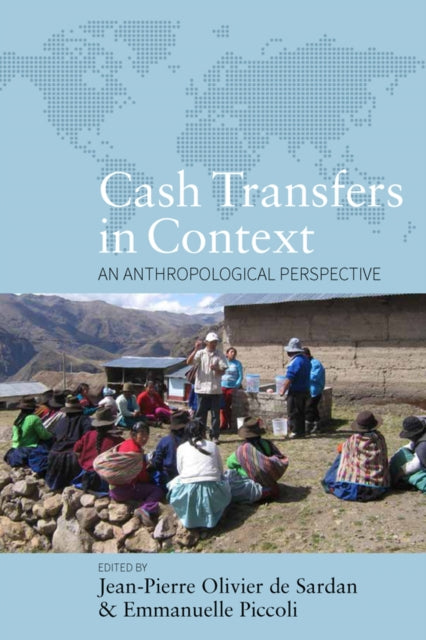Shulph Ink
Cash Transfers in Context: An Anthropological Perspective
Cash Transfers in Context: An Anthropological Perspective
YOU SAVE £3.84
- Condition: Brand new
- UK Delivery times: Usually arrives within 2 - 3 working days
- UK Shipping: Fee starts at £2.39. Subject to product weight & dimension
Bulk ordering. Want 15 or more copies? Get a personalised quote and bigger discounts. Learn more about bulk orders.
Couldn't load pickup availability
- More about Cash Transfers in Context: An Anthropological Perspective
Cash transfer programs have become the preferred channel for delivering emergency aid or tackling poverty in low- and middle-income countries, but they impose standardized norms and procedures on local contexts, leading to unpredicted consequences. This book sheds light on the importance of these contexts and the ways in which local populations interpret, circumvent, and contest external norms.
Format: Paperback / softback
Length: 342 pages
Publication date: 01 May 2023
Publisher: Berghahn Books
A decade ago, cash transfer programs were considered marginal in their status, but they have since emerged as the preferred channel for delivering emergency aid or addressing poverty in low- and middle-income countries. While these programs have brought about positive outcomes, they are often characterized by top-down development interventions that impose standardized norms and procedures regarding conditionality, targeting, and delivery. This book delves into the critical importance of these local contexts and the unforeseen consequences of cash transfer programs worldwide. It explores how actors utilize these programs to pursue their own strategies and how external norms are reinterpreted, circumvented, and contested by local populations.
Introduction:
Cash transfer programs have gained significant prominence in recent years as a means of delivering emergency aid and addressing poverty in low- and middle-income countries. These programs aim to provide financial assistance to individuals and families in need, often targeting specific demographic groups or regions affected by economic crises, natural disasters, or conflict. While cash transfer programs have been successful in achieving their objectives, they have also raised concerns about their impact on local economies, social structures, and governance.
The Importance of Local Contexts:
One of the key challenges of cash transfer programs is their tendency to impose standardized norms and procedures on local contexts. These norms and procedures are often developed based on assumptions about what works in other countries or regions and may not be tailored to the specific needs and circumstances of the recipient communities. This can lead to unintended consequences and undermine the effectiveness of the programs.
Unintended Consequences:
One of the unintended consequences of cash transfer programs is the potential for them to reinforce existing power structures and inequalities. In many cases, cash transfers are provided to marginalized communities or individuals who are already excluded from mainstream economic activities. While this may provide temporary relief, it can also contribute to the perpetuation of poverty and inequality by failing to address the root causes of these problems.
Strategies of Actors:
Cash transfer programs are used by a range of actors, including governments, international organizations, non-governmental organizations, and private companies. Each actor has its own strategies for implementing these programs, and these strategies can have significant impacts on the outcomes of the programs. For example, some actors may prioritize the efficiency and cost-effectiveness of the programs, while others may prioritize the social and human rights of the recipients.
Reinterpretation and Contestation of External Norms:
Local populations often reinterpret and contest the external norms and procedures imposed by cash transfer programs. This can lead to the development of local norms and practices that are more responsive to the needs and circumstances of the recipients. For example, some communities may use cash transfers to support local businesses or invest in education and healthcare.
Conclusion:
In conclusion, cash transfer programs have become an important tool for delivering emergency aid and addressing poverty in low- and middle-income countries. While these programs have had positive effects, they are typical of top-down development interventions that impose standardized norms and procedures on local contexts. It is essential to recognize the importance of local contexts and to develop strategies that are tailored to the specific needs and circumstances of the recipient communities. By doing so, we can ensure that cash transfer programs are more effective in achieving their objectives and promoting sustainable development.
ISBN-13: 9781800739178
This item can be found in:
UK and International shipping information
UK and International shipping information
UK Delivery and returns information:
- Delivery within 2 - 3 days when ordering in the UK.
- Shipping fee for UK customers from £2.39. Fully tracked shipping service available.
- Returns policy: Return within 30 days of receipt for full refund.
International deliveries:
Shulph Ink now ships to Australia, Belgium, Canada, France, Germany, Ireland, Italy, India, Luxembourg Saudi Arabia, Singapore, Spain, Netherlands, New Zealand, United Arab Emirates, United States of America.
- Delivery times: within 5 - 10 days for international orders.
- Shipping fee: charges vary for overseas orders. Only tracked services are available for most international orders. Some countries have untracked shipping options.
- Customs charges: If ordering to addresses outside the United Kingdom, you may or may not incur additional customs and duties fees during local delivery.


